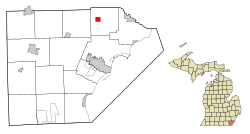Carleton, Michigan
| Carleton, Michigan | |
|---|---|
| Village | |
 Location in Monroe County and the state of Michigan |
|
| Coordinates: 42°03′33″N 83°23′27″W / 42.05917°N 83.39083°W | |
| Country | United States |
| State | Michigan |
| County | Monroe |
| Township | Ash |
| Platted | 1872 |
| Incorporated | 1911 |
| Area | |
| • Total | 0.99 sq mi (2.56 km2) |
| • Land | 0.99 sq mi (2.56 km2) |
| • Water | 0 sq mi (0 km2) |
| Elevation | 617 ft (188 m) |
| Population (2010) | |
| • Total | 2,345 |
| • Estimate (2012) | 2,329 |
| • Density | 2,368.7/sq mi (914.6/km2) |
| Time zone | Eastern (EST) (UTC-5) |
| • Summer (DST) | EDT (UTC-4) |
| ZIP code | 48117 |
| Area code(s) | 734 |
| FIPS code | 26-13220 |
| GNIS feature ID | 0622719 |
Carleton is a village in Monroe County in the U.S. state of Michigan. The population was 2,345 at the 2010 census. The village is located within Ash Township and is served by Airport Community Schools.
Carleton, which was named after Michigan poet Will Carleton, was platted in 1872 by Daniel Matthews and incorporated into a village in 1911. Primarily an agricultural community with an operating grain elevator, the village also contains several small businesses and restaurants.
According to the United States Census Bureau, the village has a total area of 0.99 square miles (2.56 km2), all land.
Carleton is at a significant railroad crossing and junction. The CSX Saginaw Subdivision crosses CN Flat Rock Subdivision in the village's downtown. The Conrail Lincoln Secondary, which allows CSX a direct connection to Detroit from Toledo, junctions with the CSX Saginaw Subdivision near the northern village boundary.
As of the census of 2010, there were 2,345 people, 953 households, and 631 families residing in the village. The population density was 2,368.7 inhabitants per square mile (914.6/km2). There were 1,048 housing units at an average density of 1,058.6 per square mile (408.7/km2). The racial makeup of the village was 96.7% White, 0.2% African American, 0.5% Native American, 0.7% Asian, 0.1% Pacific Islander, 0.2% from other races, and 1.7% from two or more races. Hispanic or Latino of any race were 2.0% of the population.
...
Wikipedia
